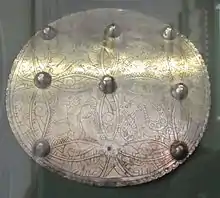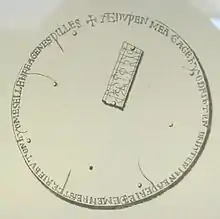Ædwen's brooch
Ædwen's brooch (also known as Sutton brooch, British Museum 1951,10-11,1) is an early 11th-century Anglo-Scandinavian silver disc brooch with an inscription on the reverse side. It was discovered in 1694 during the ploughing of a field in Sutton, Isle of Ely, Cambridgeshire, along with a hoard including coins and gold rings. The brooch was re-discovered in a private collection in 1951 and bought by the British Museum.


The Anglo-Saxon brooch is decorated with nine conical silver bosses (one now missing) and an engraved pattern of four overlapping circles forming flower-like motifs. In the circles are representations of different animals and plant ornaments reminiscent of the Ringerike style.
The inscription on the obverse side is a curse against those who would take the brooch from its rightful owner, Ædwen (Æduwen):
- + ÆDVǷEN ME AG AGE HYO DRIHTEN / DRIHTEN HINE AǷERIE ÐE ME HIRE ÆTFERIE / BVTON HYO ME SELLE HIRE AGENES ǷILLES
- "Ædwen owns me, may the Lord own her. May the Lord curse him who takes me from her, unless she gives me of her own free will."
A short film has been made that shows the curse spoken by Ædwen in Old English and modern English.[1] In addition, on the strip which once held the pin and catchplate, is an inscription of seven pseudo-runic characters.
References
- "The mystery of Sutton's silver - Ædwen's Brooch - Events - Fenlands". fensmuseums.org.uk.
- R.I. Page, An introduction to English runes, 1973 (2nd ed. 1999)
- D.M. Wilson, Anglo-Saxon ornamental metalwork 700–1000 in the British Museum The British Museum Press, 1964.
- R.L.S. Bruce-Mitford, 'Late Saxon disc-brooches' in Dark-Age Britain, London, Methuen, 1956, pp. 171–201.
- Catherine E. Karkov, The Art of Anglo-Saxon England, Boydell studies in medieval art and architecture, 2011, p. 158.
External links
- Ædwen's Brooch film and interactive games the curse spoken in Old English and modern English
- Sutton Silver Ædwen Brooch
- Silver disc brooch of Ædwen (britishmuseum.org)